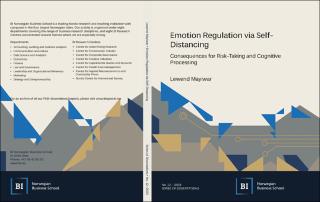Emotion Regulation via Self- Distancing. Consequences for Risk-Taking and Cognitive Processing.
Doctoral thesis
Published version
Permanent lenke
https://hdl.handle.net/11250/3122939Utgivelsesdato
2023Metadata
Vis full innførselSamlinger
Sammendrag
Emotions often carry relevant information that guides decisions, particularly in ambiguous situations. However, without proper regulation, emotions can become a source of unwanted bias. The current dissertation examines how emotion regulation influences decision-making under risk and uncertainty while also specifying the cognitive-processing mechanisms. Three preregistered empirical papers demonstrate how emotion regulation via self-distancing reduces emotional influences in decision-making under risk and uncertainty through changes in cognitive processing. Overall, the findings suggest that decision-makers who reflect on emotional problems from a more psychologically distant perspective rely less on their gut feelings and instead process information more analytically. These changes in cognitive processing, in turn, lead to downstream consequences for decision-makers’ risk-taking.
